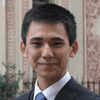Four medical students share in new digital health technology bursary

Four medical students have received a grant of £1000 each to further advance digital health technology to improve patient care.
The recently launched Digital Health Bursary will help the students, Benjamin Jones, Dina Radenkovic, Gabriel Lee and Halimat Afolabi, further their studies in their chosen fields.
Individually they are studying brain computer interfaces that could restore sight or hearing; using smartphones and wearable hi-tech to assess a patient’s heart vessels; looking at how AI is applied in MRI machine diagnosis, and using machine learning to help treat psoriasis.
The bursary is a joint initiative between BCS, The Chartered Institute for IT and DRIVE, Great Ormond Street Hospital’s Digital Research, Informatics and Virtual Environment unit.
Prof Neil Sebire, DRIVE managing director, said: “DRIVE is delighted to collaborate with BCS to support medical students’ electives in healthcare technology.
“We recognise this will become a hugely important area for future medicine. We are looking forward to collating and capturing learnings from these electives through our DRIVE informatics programme for the benefit of patients.”
It’s hoped the bursary will encourage more medical students to engage with the development of digital health technologies.
Harpreet Sood, BCS health and care vice chair, said: “This award is the first to give students a unique opportunity to widen their horizons by working in a digital health setting.”
The full information on the winners and their field of study is below:

Benjamin Jones will be on a placement at the University of California Irvine to develop an understanding of the emerging field of brain-computer interfaces (BCIs). BCIs allow bidirectional information flow between the brain and an external computer, meaning these devices have the potential to restore damaged vision or hearing, reverse disorders of consciousness and even augment our own capabilities by connecting human minds with those of intelligent machines

Gabriel Lee will be working on a placement at University College Hospital, which will look at using data analytics from phone calls, smartphones and wearables to generate insights to evaluate the state of a patient’s heart in the same way a cardiologist would do in a face-to-face consultation

Dina Radenkovic will spend four weeks at Massachusetts General Hospital and Harvard University and four weeks at the Barts Heart Centre. The aim of the project will be to evaluate and validate machine learning methods used to produce automatic cardiac magnetic resonance images.

Halimat Afolabi will be taking part in a bioinformatics and machine learning project at Newcastle University. The project aims to deliver better treatments for psoriasis sufferers through the use of machine learning algorithms



